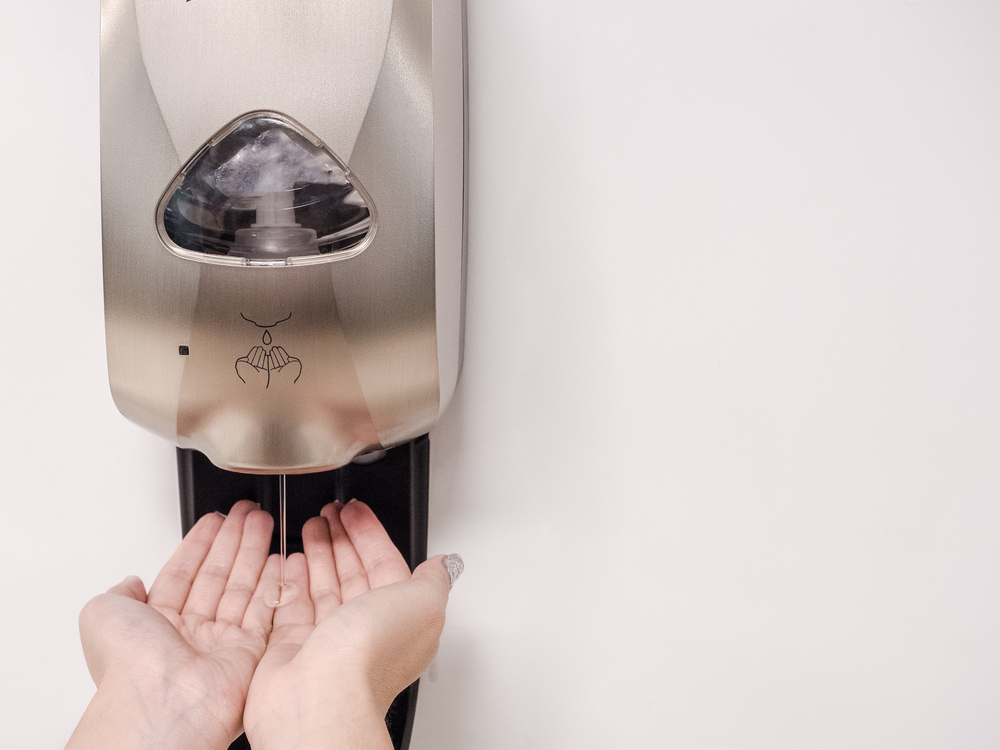
What’s More Effective: Hand Soap or Hand Sanitizer?

During flu season, keeping your hands clean is a top priority, and there aren’t that many ways to do it. Outside of thorough and consistent hand washing and generous use of hand sanitizer, the options are limited.
Thankfully, Crown Linen Service has both in great supply, and is happy to make sure that you do too. As to which method is the most effective at keeping microbes like bacteria and viruses under control, keep reading for that answer!
Hand Soap
Soap and water thoroughly lathered on hands for the duration of the “happy birthday” song has been the top recommendation for microbe control for over 100 years. While it took a revolution or two in the mid-to-late 1800’s for the hand-washing fad to take hold, it remains one of our most powerful controllers of microbial outbreak. How soap, water, and friction control microbes might surprise you, though.
How Hand Soap Works
There are many ways to make soap using many different ingredients. Throughout history, soaps have been made from saps, plants, ash, and, more recently, fats reacted with lye. Very different sources, but what they all have in common is that they dissolve oils. The purpose of soap has always been to dissolve the oil the accumulates in our hair, body, or clothes. It’s the dissolving of these oils that is at the root of hand soap’s antimicrobial effectiveness.
Hand Soap Removes Microbes, It Doesn’t Kill Them
Unless it’s otherwise stated on the bottle, most hand soaps do not kill the microbes that we don’t want on our hands. What it does is remove the oil on your hands that those microbes are holding on to, and washes them down the sink. With the microbes removed, your hands are cleaner and ready for action.
| Hand Soap Pros -Eliminates bulk contaminants like dirt and grime -Does a thorough job if done correctly -Universally effective on all microbes | Hand Soap Cons – Requires Drying (exposure to possibly contaminated surface) – Requires running waterContinual use can dry out hands – Needs to be done correctly to be effective |
Hand Sanitizer
What began as a mobile method of cleaning hands in the medical profession has exploded into global popularity. Hand sanitizer has become such a staple of day-to-day living that saying we take it for granted is an understatement. It’s freely available in your doctor’s office, your school, and even your gym. And they all have the same goal in mind: to stop the spread of harmful microbes. But do they work? And how well?
How Hand Sanitizer Works
Unlike hand soap, which doesn’t kill microbes unless otherwise stated, hand sanitizer kills microbes. The most effective sanitizers have an alcohol concentration of 60% or more, and it’s the presence of alcohol that makes them a menace to microbes.
Hand Sanitizer Breaks Microbes Down
Viruses and bacteria can exist in the environment and our bodies thanks to their outer shell. In viruses, this shell is composed of protein, in bacteria, a cell wall. Without this cell wall or protein casing, their structure collapses and they’re rendered harmless. Hand sanitizer, or the alcohol in it, breaks this wall down.
| Hand Sanitizer Pros – No water required – Less time required than hand washing – Portable – Just as, if not more, effective than hand washing | Hand Sanitizer Cons – Not recommended for young children – Dangerous if swallowed – Kills both good and bad bacteria – Doesn’t remove bulk dirt or debrisFlammable |
Is Hand Soap or Sanitizer More Effective?
The answer to which method of hand cleaning is most effective depends on the user. For soap, the CDC recommends lathering it on your hands for 20 seconds and drying with a clean towel. For sanitizer, it recommends using enough to cover the entire surface area of your hands and allowing it to dry. Used to their fullest means, both are highly effective. Not done thoroughly, they offer little protection. Perhaps the ideal hand-cleaning ritual involves thorough application of both.
No matter which method you prefer, one thing is certain — the soap and sanitizer you buy needs to be high quality. There’s no better way of getting quality soap or sanitizer than through a professional business supplier like Crown Linen Service.
For more information on our soaps and sanitizers, give us a call at (800) 733-8090, visit our website, or contact us here.
215 So. Jefferson Street - P.O. Box 597
Mexico, MO 65265
573 581-1100
322 E. Industrial Drive
Columbia, IL 62236
618 281-9099







